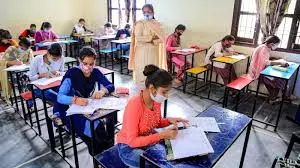Struggles of minority students go beyond cracking competitive exams

Hyderabad: Mohammad Ayub, a student of Telangana Minorities Residential Junior College, Serilingampally, cleared his JEE Mains this year with 94.8 percentile. As part of his JEE Advanced preparation, he studies up to 13 hours every day.
On what was his biggest support, he credited his school teachers for providing coaching for the competitive exam. His father, who runs a grocery store, said he would have to borrow money to pay for his son’s engineering college fee.
As per the data provided by Telangana Minorities Residential Education Institutes Society (TMREIS), 86 students qualified for JEE Advanced in 2023-24. Society secretary Aisha Masarath Khanam lauds the coaching provided by TMREIS schools that are helping students to crack the exam.
“We have 204 minority schools in Telangana, out of which 45 are in Hyderabad. We have set up some centres of excellence where special coaching is provided for all competitive exams. We have tied up with institutes like IIIT and IIT to train our faculty,” she said.
Of the 1,354 students who appeared in the Eapcet from the society, 1,176 students (86.8 per cent) qualified.
Aisha Khanam told Deccan Chronicle that girls outshone boys. Out of 732 who qualified for engineering, 345 were girls. For the forthcoming JEE Advanced, 137 girls are among the 265 candidates.
“When we enroll students in our schools, we don’t take any entrance exam. We go to rural areas and through robust campaigns we encourage parents to send students to our schools,” said Aisha.
As per a report on ‘State of Muslim Education in India’, published by the National Institute of Education Planning and Administration (NIEPA), Telangana has the highest gross enrolment ratio of Muslims (33.5 per cent) among southern states in 2020-21, outperforming Tamil Nadu (24.8 per cent) and Kerala (20.5 per cent). “Telangana exhibits relatively lower dropout rates among Muslim students, with a rate of 9.75 per cent, showcasing the state's efforts to provide inclusive and quality education,” the report stated.
A lot of institutional support is provided to students and residential schools contribute majorly in these aspects.
However, securing a seat is not the end of it. Shoaib (name changed), a second-year engineering student from Nizamabad qualified Eamcet in 2021 after a two-year coaching in the district. He moved to Hyderabad when he secured a seat at an engineering college here.
"My college fee was paid by the government as I come under the minority category. I would not have been able to pay the college fee that comes to around `90,000 per year. But the semester fee, hostel expenses and travel are paid by my parents," he said.
Securing a seat in an engineering college is not enough. Students have to focus on learning skills that would make them relevant for the job market, he said, while pointing out lack of language skills also drove away students from pursuing non-technical knowledge fields.
“With scholarships and reimbursement mechanisms, students are able to get support at the school level. However, when it comes to college level, they need financial assistance to buy books, travel and even pay fees when it comes to private colleges,” said S.Q. Masood, an activist. “I once met an autorickshaw driver who got a seat in a private college under the EWS category after qualifying in Lawcet. Another student I met at Bandlaguda told me that he got into an engineering college but the scholarship system was linked to biometric attendance,” he added. Travelling in buses, he would get late and lose his attendance for day,” he added.

